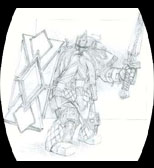A quick walk through the history of the saving throw mechanic:
(1) OD&D offered an incomplete, source/type-based array of saving throws. This created a couple of problems, one of which was that many effects would actually fall into multiple categories. Did the DM simply make a ruling for which applied? Did a character always use the best-applicable saving throw? Or should they always use the worst-applicable saving throw?
(2) AD&D eliminated that problem by establishing a fairly clear hierarchy of which saving throw category should be applied first. But it didn’t fix the other problem, which is that many effects which required saving throws didn’t conveniently fall into any particular category. There were two possible solutions: Create a new category every time you needed one or simply arbitrarily assign one of the existing saving throw categories. In general, designers and DMs did the latter. This assignation was often based on a rough approximation of “method of avoidance” (you avoid dragon breath by ducking out of the the way, this effect could be avoided by ducking out of the way, so let’s make it a save vs. dragon breath) or “similarity of effect” (dragon breath is a big blast of fire, this trap is creating a big blast of fire, so let’s make it a save vs. dragon breath). (These methods often overlapped.)
(3) D&D3 eliminated that problem by swapping to a universal system based on method-of-avoidance. In some corner-case situations, this system actually reintroduces the lack-of-hierarchy problems from OD&D (“do I duck out of the way or do I tough it out?”), but most of the time there is a clear and obvious saving throw for any given effect.
(4) 4E, of course, took the term “saving throw” and applied it to a completely different mechanic. But if you look at the mechanic which actually derives from pre-2008’s saving throws, 4E did two things with it: First, it inverted the facing of the mechanic. Instead of the defender making the saving throw roll, it’s the attacker rolling against the save.
This is an interesting choice. And to understand why, let’s consider the fact that they could have done the exact opposite with AC: Instead of the attacker rolling vs. AC, they could have swapped AC so that it works like old school saving throws (with the defender rolling against the attacker’s static score).
It’s important to understand that, in terms of mathematics and game balance, this change is completely irrelevant. It has no effect whatsoever.
In my (admittedly anecdotal) experience, however, the psychological effect of this mechanic is to make the person initiating the action feel passive: They announce the action their character is taking in the game world, but they take no “action” in the real world. Instead, the target takes the real world action.
Or, to put it another way: If you roll for an attack, the emphasis of the game becomes trying to hit people with your sword. If you roll for defense, the emphasis of the game becomes trying to dodge or deflect the blows of others. (If you roll for both, no such emphasis occurs. But this becomes too swingy with D&D’s d20-based mechanics.)
As a result, in 4E, you are always active on your turn and always passive on every other character’s turn. In 3E, on the other hand, the differentiation between the facing of attack rolls and the facing of saving throws mixes the experience up: Spellcasters generally feel more “passive” than fighters on their turn. Meanwhile, players frequently become “active” on other characters’ turns because saving throws will be called for.
Here, as with many of its design choices, 4E is flattening the game experience into something more “consistent”, but also blander and less varied. No player will ever feel as if they “didn’t do anything” on their turn, but the trade-off is that they literally do nothing while everyone else is taking their turn. (Theoretically this is then balanced out with the plethora of immediate actions that 4E adds. BID.)
The second major change 4E implemented, however, was to basically eradicate any clear connection between the action in the game world and the save/defense being used. (For example, a cleric can use his weapon vs. AC, vs. Fort, and vs. Will. Why? Because the mechanics say so.) They embrace this dissociation of the mechanics because it allows them to give every character class the ability to target different defenses without having them actually take different types of actions.
Laying aside the general effects of dissociated mechanics for the moment, this second change has the practical effect of watering down the actual meaning of the various defense scores. When Radiant Brilliance lets you charge your weapon with divine energy and trigger an explosion by hitting your target with a vs. Reflex attack and Holy Spark lets you do basically the same thing with a vs. Will attack… what’s the difference between Reflex and Will defenses? Absolutely nothing, of course. They’re just arbitrary categories that we drop various powers into for an “interesting” mechanical mix.

 My next PC:
My next PC:










